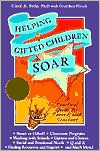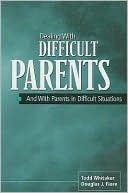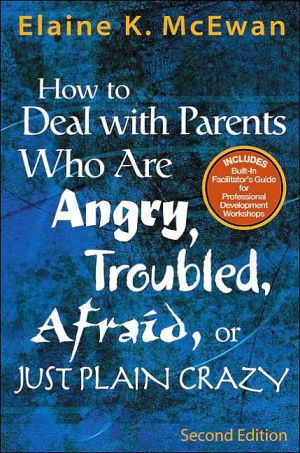Helping Gifted Children Soar: A Practical Guide for Parents and Teachers
This user-friendly guidebook educates parents and teachers about important gifted issues such as working together, evaluating classroom programs, forming parent support groups, choosing appropriate curriculum, meeting social and emotional needs, surviving the ups and downs, and much more!\ The important and useful advice provided make this book and ideal resource both for those just starting out in the gifted field as well as those who are already seasoned veterans.\ Winner of the 2001 Glyph...
Search in google:
This user-friendly guidebook educates parents and teachers about important gifted issues such as working together, evaluating classroom programs, forming parent support groups, choosing appropriate curriculum, meeting social and emotional needs, surviving the ups and downs, and much more! The important and useful advice provided make this book and ideal resource both for those just starting out in the gifted field as well as those who are already seasoned veterans. Winner of the 2001 Glyph Award from the Arizona Book Publishing Association. Duke Gifted Letter ...the book is peppered with suggestions and practical ideas.
Chapter 1\ \ Parenting a gifted child is like living in a theme park full of thrill rides. Sometimes you smile. Sometimes you gasp. Sometimes you scream. Sometimes you laugh. Sometimes you gaze in wonder and astonishment. Sometimes you're frozen in your seat. Sometimes you're proud. And sometimes the ride is so nerve-racking, you can't do anything but cry.\ \ Any and all of these reactions are normal, depending on your child and his development. Gifted children are an enormous challenge for parents. These children go through the same developmental stages that other children do, but not in the same way. One part of the child--the cognitive, or thinking, ability--is "older" than the other parts of the personality. This situation is called "asynchronous development" because the child's intellect is out of "sync" with his less developed emotional, social (and sometimes physical) abilities. Asynchronous development can leave a gifted child, as well as parents or teachers, feeling stymied, frustrated, baffled, puzzled, and confused.\ \ Imagine, if you can, that you are five years old, but you can think like a fourth-grader. Where do you find your friends? The five-year-olds are too immature, and the 10-olds don't take you seriously. If they want you around at all, it's as a sort of mascot, not as a peer. Physically, you can't do the things the fourth-graders can: you can't hit a ball very well; you have trouble riding a two-wheeler; you can't run as fast as they can. No matter how hard you try, you'll always be behind the physical and emotional curve set by your older classmates. It's like being a person who speaks only German and travels to Italy and France. You like beingthere, but because the language and cultures are different, it's hard to be understood and to get what you need.\ \ Gifted children are part of neither one of their so-called peer groups, and they are subject to teasing, put-downs, and ridicule from both children and adults. It's no wonder, then, that they sometimes feel "out-of-whack," weird, inept, and angry. Their emotions, already exquisitely sensitive, are exposed, raw, and tender, and their lack of emotional maturity can make their lives--and yours--a challenge at best and a nightmare at worst.
AcknowledgmentsPrefaceSection I: An Introduction to GiftednessChapter 1. The World's Biggest, Highest, Longest Roller CoasterChapter 2. Is My Child Gifted--Or Just Smart?Section II: Your Gifted Child and the SchoolChapter 3. Testing and Screening: How Schools Identify GiftednessChapter 4. Parents and Teachers: Understanding One AnotherChapter 5. Helping Gifted Children LearnChapter 6. The Classroom and Beyond: Learning Options for Gifted ChildrenChapter 7. Making Choices: What's Best for Your Child?Chapter 8. Learning Contracts: What They Are and What They DoSection III: Parenting and Teaching Strategies that WorkChapter 9. Building Trust, Building RelationshipsChapter 10. Accepting the Gifted ChildChapter 11. Supporting Gifted ChildrenChapter 12. Working Together for the Child's SakeChapter 13. Questions and AnswersChapter 14. Parent to Parent--A Story of HopeAppendix: Learn More AboutReferencesIndexAbout the Authors
\ B Wright"A wonderful resource for parents and teachers."\ \ \ \ \ Duke Gifted Letter...the book is peppered with suggestions and practical ideas.\ \







